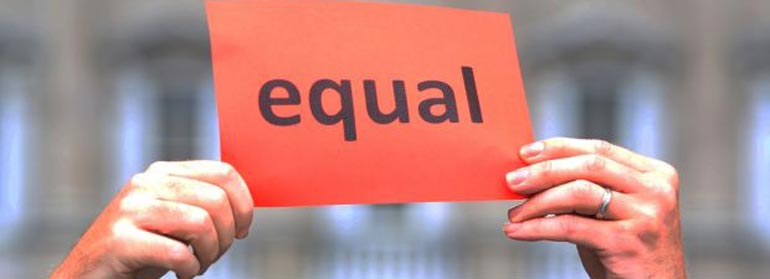Having known what it’s like to be second-class citizens of Ireland, LGBT people should support the repeal of the Eighth Amendment
I received a letter to GCN from a reader concerned with the fact that we asked LGBT candidates in the general election about their stance on the Eighth Amendment. “Since when has abortion become an LGBT issue?” the letter writer asks.
It’s a fair question. At first glance it would seem that the Eighth Amendment is far from the concerns of lesbians and gay men. When such a growing number of us want to have children against all odds, we can’t imagine being in the position where we might want to terminate a pregnancy.
Introduced in 1983 after forceful campaigning by Catholic anti-choice activists, the Eighth Amendment to the referendum promises that: “The State acknowledges the right to life of the unborn and, with due regard to the equal right to life of the mother, guarantees in its laws to respect, and, as far as practicable, by its laws to defend and vindicate that right.”
It prevents the government from legislating to allow abortion in cases of rape or incest, or where a pregnancy poses a serious risk to a woman’s life, or even in cases where a baby is incapable of being born alive.
When a woman becomes pregnant in Ireland, she achieves a ‘special’ status in terms of the treatment of her health. Because ‘fetal personhood’ is enshrined into law, from the moment of conception to the moment of birth, there is state intrusion into her human rights. Should she wish to exercise a right over her own pregnancy, the medical profession has recourse to the law.
The Health Service Executive has a document called the National Consent Policy, which states that a patient must give consent for medical treatment. Let’s say you have a brain tumor that will definitely limit your life capacity, you can decide whether to have treatment or not. Pregnant women are absented from the HSE National Consent Policy. This means, for instance, that if a woman is pregnant with a child who will certainly die at birth, she is bound to carry that child for the full term of her pregnancy, no matter what psychological and physical pain this will cause, or what the threat to her health.
The situation became horrifically apparent in October 2012, when 31-year-old Savita Halappanavar was refused an abortion in a Galway hospital, in spite of the fact she had begun to miscarry due to a bacterial infection. That infection killed her.
Every woman living in Ireland is a second-class citizen
Before May 23 of last year, I knew what it meant to be a second-class citizen of Ireland. My relationship was not afforded equal status under the constitution of my country. Because of the Eighth Amendment, the women of Ireland do not have equal status under the constitution. Every woman living in Ireland is a second-class citizen.
So, just as the marriage referendum was an equality issue, so is the Eighth Amendment. Just as LGBT rights are human rights, so are women’s rights.
Because of our long history of state and societal oppression, we know on a deep level when a human right is being abused, and this is why I believe the repeal of Eighth Amendment is something we, as lesbian, gay, bisexual and transgender people should stand together for.
Marriage equality was not just achieved through the strategising of those people in the office of the Yes campaign; it was won through ordinary people sharing their stories across Ireland and the solidarity this created. The Yes campaign was built on the idea that everyone knows someone who is gay, or at least knows someone who is related to someone gay.
Statistically, 12 women travel abroad every day to have abortions. It’s a fact that everyone knows, but wilfully puts their head in the sand about, and because of the stigma and shame attached, very few women who have been forced into this situation shed light on the truth. Over the past few months several courageous women have spoken out in the media about their experiences, but they are a scant few voices for the silent hoards of women who live in unacceptable, shamed secrecy. Just as everyone knows someone who is gay, a great many of us know these women’s stories.
Appetite for human rights issues
If the marriage referendum showed us anything, it was that there is an appetite for human rights issues in Ireland. Many politicians desperate to curry favour in the lead-up to the general election may be doing their best to ignore this fact, afraid to rock the boat on such a seemingly contentious issue as abortion (81 per cent of people in an Amnesty Ireland poll last May were in favour of a change in the legislative apparatus), but it is interesting that of the nine LGBT candidates we interviewed, six of them were in unequivocally in favour of repealing the Eighth. So far, LGBT groups BeLonG To, Dublin Pride, TENI and LINC have joined the Coalition to Repeal The Eighth Amendment, a platform of 50 organisations calling for a referendum in the next programme for government.
On May 23, 2015, when voters overwhelmingly endorsed equal marriage, there was a sense that Ireland had finally cast off the shackles of its Catholic-dominated childhood and grown up. In world’s media we saw a country reflected back to us that fully endorsed equality and human rights, after decades in which our equality and human rights had been trampled upon. But the referendum win was not the final step; it was a light shining towards a better future. We will not be a mature country until we move past the point of women’s inequality being enshrined into our constitution, until we move past the point of repealing the Eighth Amendment.
© 2016 GCN (Gay Community News). All rights reserved.
